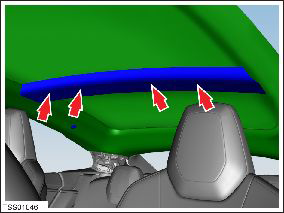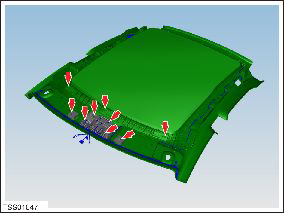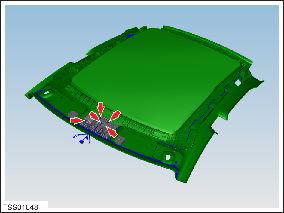Tesla Model S: Headlining (Remove and Install)
Tesla Model S (2012-2026) Service Manual / Interior trim / Headlining (Remove and Install)
Note: This procedure does not remove headlining from vehicle, the headlining remains captive within the body.
Removal
- Remove LH 'A' post trim (refer to procedure)
- Remove RH 'A' post trim.
- Release the LH upper 'B' post trim (refer to procedure).
- Release the RH upper 'B' post trim.
- Remove LH 'C' post trim (refer to procedure)
- Remove RH 'C' post trim.
- Remove driver sun visor (refer to procedure)
- Remove passenger sun visor.
- Remove rear view mirror (refer to procedure)
- Carefully release clips (x4) securing headlining center trim to cross rail. Caution: Take care not to damage component(s). Caution: Replace any broken clips.
- Release spigots (x3) and remove center headlining trim.

- Carefully release clips (x9) securing headlining to front
header.
Note: Components have been removed in this graphic to aid clarity.

- Disconnect harness connectors (x5) from overhead console.

- Working front to back, release wiring harness from headlining and clips (x3).
- Release rear header clips (x3) and remaining cantrail clips (x6).
- Disconnect harness connectors from both rear map lights.
- Release wiring harness from rear headlining clips (x2).
- Position wiring harness aside for access.
- Cover and support headlining.
Installation procedure is the reverse of removal.
Note: The windshield must be removed for access, if headlining is being replaced.
READ NEXT:
 Headlining (Remove and Replace)
Headlining (Remove and Replace)
Removal
Remove front windshield (refer to procedure)
Lower headlining for access (refer to procedure)
With assistance remove headlining through front windshield
opening.
Remov
 Headliner - Panoramic Roof (Remove and Install)
Headliner - Panoramic Roof (Remove and Install)
Note: This procedure does not remove the headliner from
vehicle; the headliner remains inside the vehicle cabin supported by
the tops of the seats.
Removal
Remove the LH A-pillar
 Headlining - Panoramic Roof (Remove and Replace)
Headlining - Panoramic Roof (Remove and Replace)
Removal
Remove front windshield (refer to procedure)
Lower headlining for access (refer to procedure)
With assistance remove headlining through front windshield
opening.
Remov
SEE MORE:
 Seal - Rear Door - LH (Remove and Replace)
Seal - Rear Door - LH (Remove and Replace)
Removal
Remove door trim (refer to procedure)
Release clips (x2) securing flap seal end to door.
Note: Components have been removed in this graphic
to aid clarity.
Caution: Take care not to damage component(s).
Carefully release remai
 Hinge - Hood - LH (Remove and Replace)
Hinge - Hood - LH (Remove and Replace)
Removal
Remove the hood assembly (refer to procedure).
Mark the installed position of the hinge to the hood.
Remove the nuts (x2 or x3) that secure the LH hinge to the hood
(torque 24 Nm).
Caution: Protect exterior paint work from possible
damage during this pr
© 2019-2026 Copyright www.tesms.org

